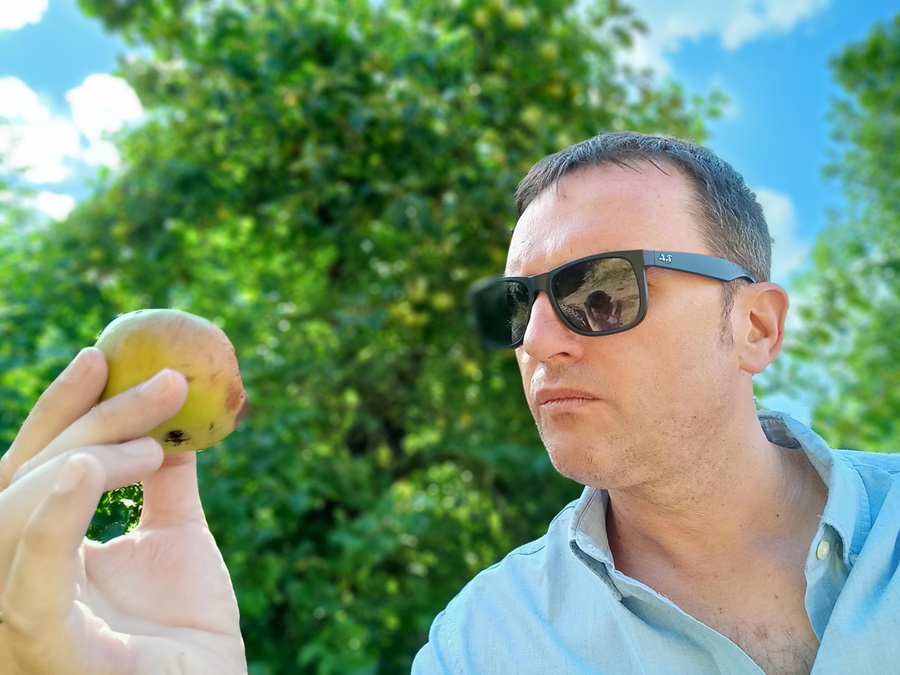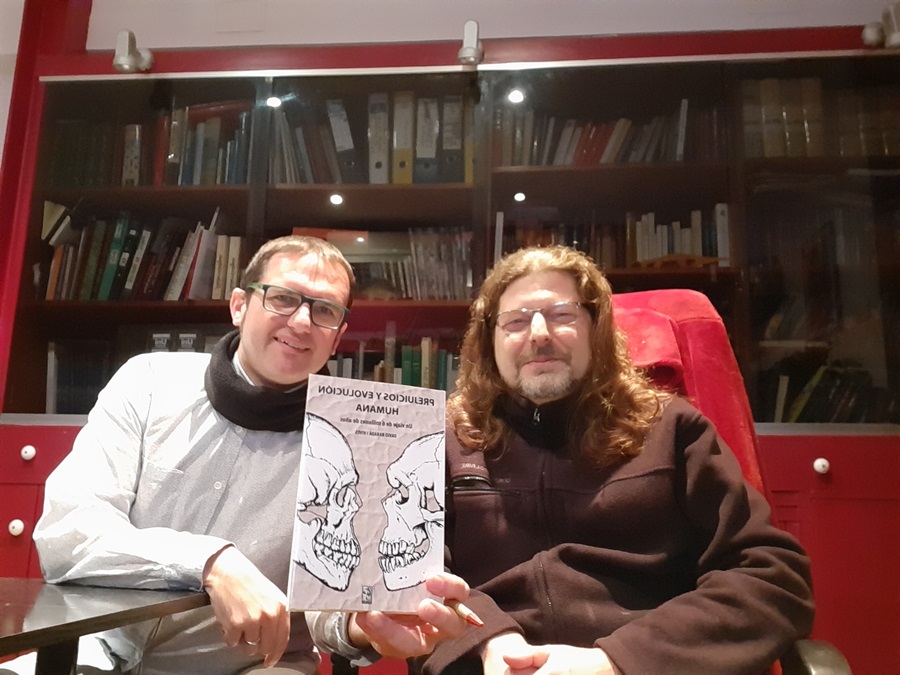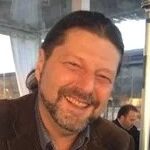- Face to face
- 18 de October de 2024
- No Comment
- 11 minutes read
Antoni Hernández: “A great teacher transcends educational laws”

FACE TO FACE WITH
Antoni Hernández, physician, linguistic and Doctor in Cognitive Science and Language
Antoni Hernández:”A great teacher transcends educational laws”

Antoni Hernández is a physicist and linguist who holds a PhD in Cognitive Science from the University of Barcelona. With 27 years of experience teaching at the secondary level, he now serves as an associate professor at the Universitat Politècnica de Catalunya (UPC), where he is also the deputy director of the Institute of Education Sciences, responsible for training teachers in technology and vocational education. However, teaching is not the only field in which this inquisitive scientist operates. At the UPC, he is researching the application of mathematical and physical models to the study of communication and learning. In other words, Hernández’s work bridges the humanities, science, and technology, with a particular emphasis on education and dissemination.
His prolific career includes more than forty published books, as co-author, such as Enrico Fermi (RBA, 2013), and co-authored works like Lingüistica quantitativa (Ediciones El País, 2019) and La educación cancelada (Sloper, 2022). He is also a member of the board of the Societat Catalana de Tecnologia (SCT), where he edits the Revista de tecnologia, and has been part of UPC’s Comité ético since its inception. At the SCT, he translated and edited Filosofia de la tecnologia (UPC-IEC, 2019), a commemorative work marking the centenary of physicist and philosopher Mario Bunge. More recently, he has edited Inteligencia artificial y Tecnoética (Diàlegs UPC Arts, 2022) and Creatividad Ccmputacional (Diàlegs UPC Arts, 2023). A pioneer in introducing generative AI tools into the classroom, Hernández has been collaborating on the topic since 2022 with the AIHUB-CSIC summer schools and curated the exhibition La Nube AI (2022-23) for the Fundación La Caixa.
What motivated you to pursue your current career?
The curiosity to learn, instilled in me by my parents, and the indispensable support of the teachers I encountered along the way.
From whom did you gain a deeper understanding of the social reality we live in, and why?
Oh, from many people. But primarily, it was at home and on the streets. My mother was an intelligent and creative woman who, due to the sexism of her time, could not pursue the education she desired. She became a trained seamstress and pattern maker, balancing this work with household responsibilities. I’m the eldest of four siblings, and when I was young, my mother was also caring for two great-grandparents. She was a fighter and made it clear that education was crucial for our future.
And your father?
My father worked tirelessly as a truck driver and beer deliveryman. From an early age, my brother and I would help him, especially in the summers, delivering beer to bars. This experience, being out on the streets and directly interacting with people, helped me understand the world around me. My father, born in Baza (Granada), used to say, “The boxes weigh more than the books”.
A phrase with profound meaning. May it have some kind of relation to your latest professional projects?
Yes, at present, I’m working on several projects. One of them is a research project we’ve just submitted for a European call for proposals, focusing on artificial intelligence (AI).
What is the aim of this new AI project?
The project seeks to shed light on why AI responds the way it does in real educational settings.
Where do you get the data to work on AI in education?
The Universitat Politècnica de Catalunya, along with its Institute of Educational Sciences and IthinkUPC, provides the case studies for applying AI in education.
“Caution is essential, and we must conduct thorough research on AI before rushing to apply it, particularly taking ethical considerations into account”
Many people speak with fear about AI. What do you think about it?
Caution is essential, and we must conduct thorough research on AI before rushing to apply it, particularly taking ethical considerations into account. In parallel, we are also developing a comprehensive training programme on AI for university teaching.
What positive links do you see between your professional and personal development and the education you received at school?
It’s a complex question, but all stages of education are crucial. However, I would particularly highlight my love of reading and science. My great-grandmother Maria learned to read very late in life, and in applying the idea of “don’t let it happen to you”, she taught me the letters and numbers when I was very young, using an illustrated alphabet.
So, you owe her a lot?
Absolutely. While everyone else was busy, she devoted that precious time to what we now call early stimulation. Thanks to my mother, I started reading early, and my father engaged us with questions ranging from football to words in the 1Bastetano dialect, which sharpened our memory. My parents made sacrifices and bought us several encyclopaedias, including one on science, which I fell in love with. At first, I didn’t understand much, but I was driven to learn…
Was that family drive alone enough for you to achieve your current success?
Not entirely. Later on, I was fortunate to encounter many great teachers, and I attended a very good public school in Barcelona, L’Alzina. There, I was particularly influenced by my physics teacher, Carlos Castell, my mathematics teacher, Jesús García (“Bacterio”), my language teacher Ignacio Yebra, and Robert Canal in biology. They were all especially helpful to me.

Regarding the current education system, do you think it would have helped or hindered your professional growth?
Tu quoque, filii mei? You surprise me with that question, David. (laughs). What you are asking is science fiction, but I trust in the immense power of great teachers. Had I been taught by the same teachers I had back in the 2EGB, BUP and COU, I would have been well-educated regardless. A great teacher transcends educational laws—they would have found a way to help me, no matter what.
Do you believe educational legislation influences?
Absolutely! Nowadays, those same teachers would probably suffer from increased bureaucracy, leaving them less time to properly prepare lessons. It’s clear the current confusion of legislators, creating curricula that marginalise knowledge and the pace of learning. Equally absurd are study plans that, in some schools, make it impossible to study both physics and biology at A-level. Surprisingly, we are faced with problems like oversized classes—my son, for example, is in his second year of A-levels and has common subjects with over 35 students in his public school.
“We need to reduce class sizes where overcrowding is evident and eliminate the many wasted hours spent on trendy, superficial subjects”
Given your professional trajectory, how do you think the current education system could be improved?
First and foremost, we need to reduce class sizes where overcrowding is evident and eliminate the many wasted hours spent on trendy, superficial subjects. We need a solid, stable foundation in the humanities, sciences, and technology, starting from primary education.
Could you suggest specific improvements?
Certainly. First, we should reduce the fragmentation of subjects, grouping content more coherently and incorporating technology from primary school. Core subjects should be stronger, providing a cultural foundation that prioritises depth over breadth. Second, we need to strengthen the academic content and structure by promoting a curriculum that combines theory and practice, allowing students to explore key subjects in depth, instead of skimming through too many superficial topics. Third, we must establish stability in the education system by reducing curriculum changes and reaching a political agreement that ensures continuity, avoiding constant disruption for teachers. Fourth, we should improve career guidance for students by reinstating a single pre-university year dedicated to university preparation, similar to the old system. Fifth, we need to invest in expanding public education and improving teacher training. There should be more places available in vocational training courses and in high-demand courses, where cut-off marks are currently too high. We must also enhance initial teacher training and continuous professional development, focusing on effective methodologies suited to the 21st century, backed by high-quality materials. Finally, we need to restore values of respect, discipline, and study habits in schools and in the profession ensuring an optimal learning environment with adequate, uncrowded spaces.
“My wish, in line with Bunge, is to help ensure that everyone has the words and knowledge that prepare them as individuals for life”
Ideologies are often part of who we are, but from a utopian perspective, what would be your wish for your personal or national environment?
Mario Bunge said, “There is no society without politics, nor politics without ideology. And it’s not that political or social struggles are won with words, but without them, they cannot be fought”. My wish, in line with Bunge, is to help ensure that everyone has the words and knowledge that prepare them as individuals for life, from the intimate (to express themselves well with their partner, family, friends…) to the public sphere (studies, work…), so they can truly participate in society or politics with freedom and critical thinking, or at the very least provide them with the tools to face it all.
Lastly, what do you hope for in your personal life?
To continue enjoying the small pleasures in life, in good health.
___
1 dialect spoken in Baza, a town in the province of Granada, Spain.
2 old primary and secondary system
Source: educational EVIDENCE
Rights: Creative Commons


